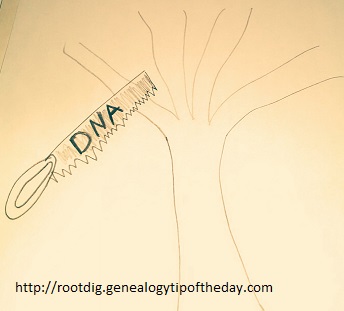I’m working on analyzing DNA test results for an individual whose mother was likely the result of a “short-term” relationship his grandmother had late in 1912 while she was married to someone else.

The test results made me change the tree.
Without going into details, the DNA matches (shared and, more importantly unshared) confirm this suspicion.
While “short-term relationship” is a nicely worded phrase (and fairly discreet), I’m wondering if some matches might be put off by the concept that (in at least one case) the partner in the “short-term” relationship was the matches grandparent or uncle.
It’s important to remember that we are not responsible for the actions of our forebears.
We’re also not responsible for the reactions of others to “news” revealed by DNA.
We will be discussing this relationship scenario and the test results in my upcoming online AncestryDNA class.

4 Responses
I am afraid I have to disagree with your final sentence. I think that, to a certain extent, DNA genealogists do have a responsibility to handle those NPE events with discretion and sensitivity. Yes, I know we all put our DNA out there, but the testing companies have marketed these tests as fun ethnicity exercises. A lot of folks take the tests to find out how Irish they are. Information about grandparents’ dalliances or worse were never supposed to be part of the deal.
Just my $0.02.
One does have to take into account the amount of time that has passed since the “event.” How something is discussed and mentioned depends in part based upon how long ago the event took place and what perception of reality was passed down to the present day. How I’d handle a situation where living individuals discover a “new” sibling is different from how I would mention an apparent “short-term” relationship in 1913.
For the most part, I’d have to agree with you, Michael, but Deb does have a certain point. Take Ancestry DNA for example. I have not seen ONE of their commercials that talk about finding a long-lost relative or unknown branch of the family–the TLC show “Long Lost Family” aside. They all focus on those fun maps & pie charts. Now we all *know* we’re supposed to read the fine print when we buy something, but how many of us really do? Too many testers on these websites shut down when contacted by unknown family members, especially if that family member is a result of “unwanted revelations”. Personally, I think Ancestry & others could do a much better job of advertising ALL that comes with spitting in their tube.
I’m in complete agreement that the testing companies emphasize the “fun” of maps and pie charts and not the cold reality that you could discover close relatives you never knew existed, that Grandma’s children did not have the same father, that Great-grandpa had children no one knew about, etc.
And I think that one does need to contemplate how to “announce” these things when it involves living family members. That’s different than a “surprise” parentage discovered for a birth 110 years ago or more.